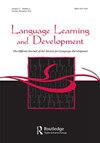The Effect of Explicit Instruction on Implicit and Explicit Linguistic Knowledge in Kindergartners
IF 1.4
2区 文学
0 LANGUAGE & LINGUISTICS
引用次数: 2
Abstract
ABSTRACT Research consistently shows that adults engaged in tutored acquisition benefit from explicit instruction in several linguistic domains. For preschool children, it is often assumed that such explicit instruction does not make a difference. In the present study, we investigated whether explicit instruction affected young learners in acquiring a morpho-syntactic element. A total of 103 Dutch-speaking kindergartners (M = 5;7) received training in a miniature language to learn a meaningful agreement marker. Results from a picture matching task, during which eye movements were recorded, provided no evidence that explicit instruction led to higher accuracy rates, but suggest that it did lead to earlier predictive eye movements. These data seem incompatible with the idea that explicit instruction does not make a difference when kindergartners learn a grammatical element, and tentatively suggest that explicit instruction has a different effect on explicit knowledge than on implicit knowledge in this age group.外显教学对幼儿内隐和外显语言知识的影响
研究一致表明,从事辅导习得的成年人受益于几个语言领域的显性教学。对于学龄前儿童,人们通常认为这种明确的指导不会产生影响。在本研究中,我们调查了外显教学是否影响了青少年学习者对一种形态句法元素的习得。共有103名荷兰语幼儿园儿童(M = 5;7)接受了微型语言培训,学习有意义的协议标记。在一项图片匹配任务中,眼球运动被记录下来,结果显示,没有证据表明明确的指示会导致更高的准确率,但表明它确实会导致更早的预测眼球运动。这些数据似乎与外显教学对幼儿园儿童学习语法元素没有影响的观点不一致,并初步表明外显教学对这个年龄段的外显知识和内隐知识的影响不同。
本文章由计算机程序翻译,如有差异,请以英文原文为准。
求助全文
约1分钟内获得全文
求助全文

 求助内容:
求助内容: 应助结果提醒方式:
应助结果提醒方式:


